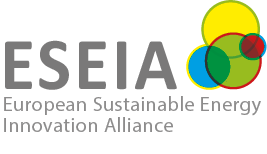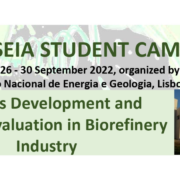ESEIA International Student Camp 2022 Challenged Students to Develop Innovative Solutions for Biorefinery Industry
The ESEIA International Student Camp on Process Development and Evaluation in Biorefinery Industry took place 26-30 September at the National Laboratory for Energy and Geology (LNEG) in Lisbon, Portugal.
This year’s edition gathered 13 students from around the world (Portugal, Austria, Germany, India, Nigeria, and Puerto Rico) pursuing their studies or working in fields such as (Bio)Chemical Engineering, Bioenergy, Biorefinery Engineering, Environmental Engineering, and Mechanical Engineering. They all came together with one goal: to challenge themselves and solve complex problems with experts from industry and academia.
Students were given six lectures covering topics such as biorefinery concepts, entrepreneurship, alternative renewable sources of energy, etc. In addition to lectures, students participated in supervised group work sessions where they developed solutions to challenges related to bioenergy and biorefineries.
According to the host Luís C. Duarte from LNEG, the lectures were designed to pass on information about the current biorefinery products and processes with real-life examples to equip the students with all the tools and knowledge needed to solve the challenges.
Both teaching and mentoring were provided by industry experts and professors, namely Luís C. Duarte (LNEG), David Loureiro (LNEG), Florbela Carvalheiro (LNEG), Himanshu Himanshu (TH Köln – University of Applied Sciences), Walter Wukovits (Vienna University of Technology), Marlene Kienberger (Graz University of Technology), Julian Selinger (Graz University of Technology), Macedon Moldovan (Transilvania University of Brașov), and Bartha Sandor.
Company challenges solved by students
The participants were divided into small teams and given three challenges that required them to apply their knowledge towards finding solutions for improving energy efficiency or evaluating process alternatives for PAIP, a Portuguese technology supplier in the area of olive by-products.
The first challenge consisted in determining which parts of the PAIP olive pomace oil process could be combined and how much energy and water savings could be achieved. The students also analysed the ways renewable energy sources and membranes could be integrated into this process.
In the second challenge, students had to focus on two main processes: alternative drying systems that rely on solar energy and bioenergy production from the extracted olive pomace.
The last challenge presented to the students invited them to think outside the box to come up with ideas for improving biomass (and derived materials) utilisation. The students had to think about how they could use excess extracted olive pomace, what other feedstocks could be treated, and what alternative extraction systems could be used.
The peer-to-peer learning approach combined with full collaboration among teams and mentors led to successful solutions presentations by all groups at the end.
Did you know?
This year’s ESEIA International Student Camp was organised in the tradition of a series of events held during the Horizon 2020-funded BioEnergyTrain project. What started as an innovative learning format created to address knowledge gaps soon became a successful annual event organised by ESEIA and hosted by our member organisations after the project ended. Once again, we are grateful for everyone’s contribution to these events!
Additional resources
ESEIA International Student Camp 2022 Flyer
Contact:
Luís C. Duarte, LNEG, Lisbon, Portugal: luis.duarte@lneg.pt
ESEIA Team: office@eseia.eu


